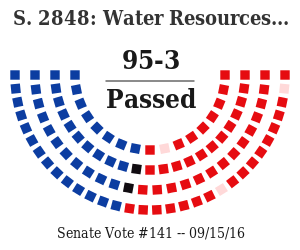The U.S. Senate has passed a bill that includes several provisions that would support Great Lakes protection, including the establishment of a Great Lakes Algal Bloom Coordinator to address the issue of harmful algal blooms.
Passed by a 95-3 vote, the bill reauthorizes the Water Resources Development Act (WRDA) for two years.
The bill includes several provisions of importance to Great Lakes interests, including reauthorization of the Great Lakes Restoration Initiative and the Great Lakes Fish and Wildlife Restoration Act, dedicated funding for the Great Lakes Navigation System, measures to support revitalization in waterfront communities, and actions to address water infrastructure needs and safeguard drinking water.
“Bipartisan, strong leadership from the entire Great Lakes Senate delegation helped ensure that provisions supporting the Great Lakes were included in this legislation,” said Tim Eder, executive director of the GLC.
“The Great Lakes are the bedrock of our economy, support a thriving ecosystem, serve as a source of drinking water for more than 48 million people and directly generate more than 1.5 million jobs and $60 billion in wages annually. We urge the House to pass similar Great Lakes provisions in its version of the legislation swiftly, so that the House and Senate versions can be reconciled and signed into law.”
Other provisions in the Bill include:
- Authorization of the Great Lakes Restoration Initiative, a successful and popular program that is helping states and local communities clean up degraded toxic hotspots, restore habitat for fish and wildlife, thwart Asian carp and other invasive species, and prevent polluted runoff across the eight-state Great Lakes region.
- Authorization of the Waterfront Community Revitalization and Resiliency Act, which supports community efforts to leverage water resources by attracting water-dependent industries and investments
- Reauthorize the Great Lakes Fish and Wildlife Restoration Act, which supports fish and wildlife restoration, conservation and management projects in the Great Lakes region
- Amend several federal programs and provide funding to address problems facing water infrastructure and help communities protect drinking water.
The bill must also be passed by the House of Representatives and White House before it becomes law.









